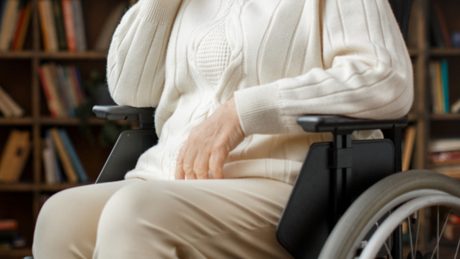Alison Goldney, a senior associate in our Clinical Negligence team, secures £3m for horse enthusiast left paraplegic due to medical negligence. At the time of her injury, ST was 44 years old and had her own livery business. Horses were her main passion in life, and she owned 16 ponies. ST spent the majority of her time in the outdoors, either riding, walking her dogs or attending music festivals.
The incident
In October 2012, ST started to develop pain in her upper back, under her left shoulder blade. The pain increased in severity and ST attended her GP on 7 November 2012. The pain continued, and after several more visits to her GP, ST undertook an x-ray and was diagnosed with mild scoliosis of the thoracic spine. ST continued to visit her GP periodically as the severity of her symptoms worsened. She was prescribed a plethora of pain killers and attended a chiropractor, all to no effect. In December, ST GP referred her to a back specialist.
ST was seen by a clinical specialist physiotherapist on 19 December 2012. She was suffering from severe back pain that was aggravated by coughing and twisting. It was diagnosed that ST had a costovertebral T6/T7 sprain and she was referred for physiotherapy.
On 27 December 2012, ST began to experience numbness from her chest down. She went back to her GP, who referred her to her local hospital.
The hospital noted ST’s symptom development, including red flag symptoms of persistent thoracic and cough impulse pain. However, ST’s treatment was not dealt with as a matter of urgency. An MRI scan was requested, along with blood and urine tests. The bloods were suggestive of infection, and the MRI scan identified discitis with extensive paraspinal soft tissue involvement with evidence of some collection. The plan was to obtain cultures before commencing antibiotics and to list for surgery.
ST’s sensation and motor impairment continued to decline, and she began to experience impaired coordination. ST was reviewed the next day, and it was considered that she had an epidural abscess. ST underwent a laminectomy on the same day.
ST spent the next five weeks on bed rest at hospital while receiving antibiotics intravenously. Once the infection was gone, ST was transferred to a spinal unit to undertake rehabilitation.
Injury
As a consequence of the delay in diagnosis of ST’s spinal abscess, ST was rendered T3 AIS D motor and sensory incomplete paraplegic. She is able to walk short distances with the aid of two sticks. However, for longer distances she requires a mobility scooter or a wheelchair. She suffers from neuropathic pain and spasms in her back, pelvis and legs. She has bladder and bowel dysfunction, and her balance is impaired, causing her to trip or fall regularly. As a consequence of her pain, she suffers from significant fatigue. ST is reliant on carers to aid with and support her daily living, and this need will increase with age.
The legal case
Nadia Krueger-Young, an associate in our team, investigated a claim against the GPs whom ST saw and the hospital where she attended the physiotherapy assessment. Independent expert evidence was obtained. It was felt the GPs had discharged their duties however physiotherapy and orthopaedic reports were critical of the standard of care provided by the hospital’s physiotherapist. There had been a failure to assess ST sooner, a failure to urgently refer ST to an orthopaedic surgeon or neurosurgeon, and a failure to refer ST for urgent blood tests and an MRI scan.
A Letter of Claim was sent, and the Letter of Response from the defendant denied the allegations of breach of duty, save that they accepted that ST should have been referred for blood tests (although they denied that this had any causative effect).
Court proceedings were commenced, and the defendant admitted in their defence and subsequent correspondence that an urgent MRI scan should have been performed, and this would have led to ST achieving a good neurological outcome. Judgment was entered in November 2017.
Interim payments
Following discharge from the spinal unit, ST was determined to keep up her rehabilitation, especially hydrotherapy, which she found most effective at providing her with long-lasting pain relief. She also wanted to purchase an all-terrain scooter to allow her to walk her dogs, tend the horse yard and attend music festivals. This was funded through interim payments, which were vigorously pursued and obtained following the defendant’s admission of liability.
Settlement
A number of experts were required to quantify the claim, and from the outset it was clear that the biggest area of importance for ST was being able to return to her pre-injury life as much as possible in relation to her ability to ride and care for her ponies. Our care and occupational therapy expert was instructed to report on the horse aspect of ST‘s needs, and this made up a large part on her claim. Some of the needs that were considered were costings for a live-in groom, specialist riding equipment (such as a purpose-built saddle), and evidence on how long ST would be able to ride with her injury compared to if the injury had never occurred.
The part of the claim where the ponies had the most significant impact was accommodation. It was important to ST for her to have a property within a specific radius of her current home with enough land to house her ponies. These properties were few and far between, meaning that the cost of purchasing a suitable property was very high. Following the settlement, ST was able to purchase her dream home which will enable her beloved horses to live on-site with her and enable her to ride them as frequently as she wishes.
A joint settlement meeting was held in February 2019, which did not result in a settlement. Useful discussions were held, nonetheless, in an attempt to narrow the issues between the parties. Aside from the accommodation claim, the other major disparity between the parties was the level of care and support ST required both now and in the future. We argued on ST’s behalf that the purpose of care was to enable ST to return to her pre-injury lifestyle as much as possible and a substantial amount of her care claim related to having assistance to ride her ponies as often as possible.
Following the joint settlement meeting, the parties agreed to keep the dialogue open and each party made its own respective Part 36 offer. This led to the case eventually settling for a lump sum of £3m. ST opted to receive this as a lump sum with no periodical payments so that she had sufficient capital to enable her to purchase her dream property.
The settlement has enabled ST to purchase a property where her ponies can live on the land and to obtain support to both care for her horses and enable her to return to riding as frequently as she wishes. ST has also purchased an adapted motorhome, which she put to good use over the summer, attending a number of music festivals.
Testimonial from ST
“The professionalism at Stewarts was absolutely spot on. Alison Goldney was really good at keeping me up to date with the case and explaining things in layman’s terms, which made me instantly feel at ease. I had every faith that Alison and her team was doing their best to achieve the best outcome for me. Everyone at Stewarts was very approachable and helped with my questions, and I would definitely recommend them.
“Since the injury, it hasn’t been easy returning to my favourite hobbies. I can no longer go out dancing with my friends and haven’t been able to enjoy other social activities. The settlement has helped me a lot in terms of getting an adapted motorhome close to the horses and hiring someone to look after them. I have also managed to get a smaller pony, which allows me to ride frequently.
“Without the settlement, I would never have considered carrying on my passion for looking after horses. It has given me peace of mind for the future, and I feel like I can breathe with this financial help.”
You can find further information regarding our expertise, experience and team on our Clinical Negligence pages.
If you require assistance from our team, please contact us or alternatively request a call back from one of our lawyers by submitting this form.
Subscribe – In order to receive our news straight to your inbox, subscribe here. Our newsletters are sent no more than once a month.





